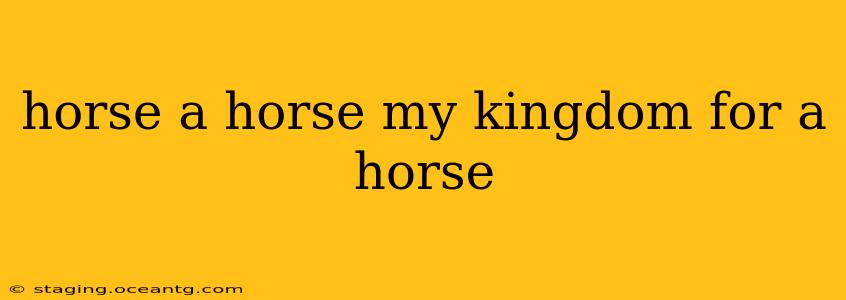Shakespeare's immortal line, "A horse! a horse! my kingdom for a horse!" from Richard III, resonates even today, despite its seemingly simple structure. This seemingly straightforward plea for a steed belies a deeper meaning, rich with historical context and dramatic irony, that continues to fascinate and inspire. This exploration dives deep into the line's significance, tackling common questions and unveiling its enduring power.
What Does "A Horse! A Horse! My Kingdom for a Horse!" Really Mean?
The immediate interpretation is Richard III's desperate desire for a horse during the Battle of Bosworth Field. He's losing the battle, his army is crumbling, and he needs a fresh mount to escape the imminent threat of death. However, the repetition and the extravagant offer ("my kingdom") highlight more than just a need for transportation. It reveals Richard's desperation, his acknowledgement of his imminent defeat, and the utter collapse of his ambitions. The line speaks to the fragility of power and the ultimate futility of his ruthless pursuit of the throne.
Why Is Richard III So Desperate for a Horse at This Moment?
Richard's desperation stems from several factors converging at the battle's climax. Firstly, his current horse is likely exhausted and injured, leaving him vulnerable on the battlefield. Secondly, a fresh, strong horse represents his only chance to escape the overwhelming force of Richmond's army and potentially regroup. Finally, and perhaps most importantly, losing the battle means losing his kingdom – his entire life's ambition is about to crumble, making the need for escape paramount.
What is the Significance of Offering His Kingdom for a Horse?
The offer of his kingdom for a horse is not meant to be taken literally; it's a hyperbolic expression of his extreme desperation. The vast disparity between the value of a kingdom and a horse underscores the criticality of the situation. It's a dramatic statement highlighting the sudden and utter collapse of his power and the complete reversal of his fortunes. He's willing to sacrifice everything he has worked for, all his ambition and cruelty, for a mere chance at survival.
What is the Dramatic Irony in Richard III's Plea?
The dramatic irony lies in the fact that Richard's kingdom is already essentially lost. His plea is futile; he cannot reclaim his kingdom even if he escapes. The audience is aware of his impending doom, making his desperate cry all the more poignant. His relentless pursuit of power has ultimately led to his downfall, and his final moments are filled with the desperate, almost pathetic, yearning for escape.
What Makes This Line So Famous and Enduring?
The line's fame rests on several factors. Its brevity and repetitive structure make it highly memorable. The stark contrast between the grand scale of "my kingdom" and the seemingly mundane request of "a horse" creates a powerful image of desperation and the fleeting nature of power. The line perfectly captures a moment of intense human drama, relatable across centuries despite its historical context. It continues to resonate because it speaks to universal themes of ambition, loss, and the fragility of power.
How Does This Line Contribute to the Overall Theme of Richard III?
The line serves as a microcosm of the play's larger themes. It encapsulates Richard's hubris, his ultimate failure, and the ironic consequences of his ambition. It highlights the play's exploration of power, morality, and the cost of ruthless pursuit of one's goals. The desperate cry underlines the devastating consequences of his actions and provides a fittingly tragic end to his reign.
In conclusion, "A horse! a horse! my kingdom for a horse!" is far more than a simple request; it's a powerful encapsulation of desperation, the fragility of power, and the tragic downfall of a tyrannical king. Its enduring legacy lies in its ability to convey profound meaning with stark simplicity, making it one of Shakespeare's most memorable and impactful lines.
